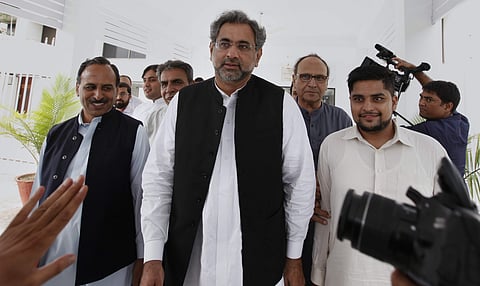Pakistan PM Shahid Khaqan Abbasi's Nepal visit leaves India wary
NEW DELHI: Pakistan’s Prime Minister Shahid Khaqan Abbasi left Nepal on Tuesday after a two-day state visit during which he lobbied for the revival of the stalled South Asian Association for Regional Cooperation (Saarc) summit and pledged to ramp up cultural, economic and political ties with the Himalayan kingdom.
Abbasi is the first foreign head of state to visit Nepal after Prime Minister Khadga Prasad Sharma Oli took office last month. Though it declined to comment officially, New Delhi has been eyeing the visit warily because Oli is seen as pro-China, and the possibility of Nepal joining the China-Pakistan axis against India could put it in a bit of a bind.
Describing the visit as part of Pakistan’s “pro-active and outreach efforts” to woo nations in the region, Pakistan’s foreign office described Nepal as an “important, regional country” and “a close friend,” and said, “Our ties with Nepal are characterized by cordiality, mutual respect and commonality of interests. Our support to each other at bilateral and multilateral fora has remained indispensible for both the sides.”
India has been making fervent efforts to revive the relationship with Nepal, with foreign minister Sushma Swaraj and Army chief General Bipin Rawat visiting Kathmandu in quick succession recently. But Oli, who believes India was behind his ouster as Prime Minister in 2016, has publicly declared that land-locked Nepal would strive to overcome its dependence on India by reaching out to its northern neighbour, China. “We have great connectivity with India and an open border. All that’s fine and we’ll increase connectivity even further, but we can’t forget that we have two neighbours… We don’t want to depend on one country or have one option,” Oli told the South China Morning Post in an interview.
China has pledged billions of dollars in aid and other ventures to Nepal, and recently cracked India’s monopoly on Nepal’s Internet services by linking a new service to the country.Nepal’s decision to join China’s Belt and Road Initiative and the ramping up of infrastructure and rail and road connectivity across the Tibetan Plateau with mainland China are also seen as part of Kathmandu’s effort to slowly delink itself from New Delhi.Nepal was also seen as a hub for Pakistan’s ISI for a while, until New Delhi ‘convinced’ Kathmandu that this was detrimental to bilateral relations.Abbasi’s plea to Nepal, the current chair of Saarc, to revive the summit as well as growing calls to admit China as a member of the outfit, have also been noted in New Delhi with concern.
A senior Indian official, however, struck a positive note. “You can’t just ignore or overturn centuries of social, cultural and economic ties between two nations overnight. Nepal has every right to expand its trade and political relations with any country it wishes. But Kathmandu must be aware that China’s economic largesse comes with a lot of strings, and keep in mind that Pakistanis themselves are questioning the much-touted China Pakistan Economic Corridor, part of the BRI. As for Saarc, it is likely to remain dead in the water until Pakistan proves it no longer uses terror as a state policy. ”

